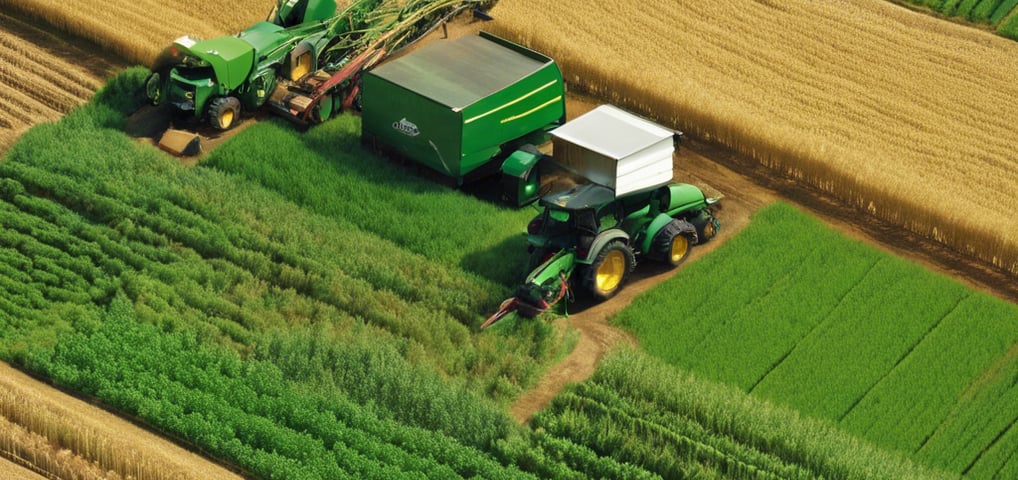The Future of Farming: Harnessing AI in Indian Agriculture for Sustainable Growth
As the global population grows, India's agriculture faces increasing pressure to meet food demand. With its rich history and diverse crops, Indian farming is embracing technology to overcome these challenges. Artificial Intelligence (AI) is transforming agriculture through predictive analytics and precision farming, helping farmers manage resources, improve yields, and drive sustainable growth. In this blog, we explore how AI is shaping the future of Indian agriculture, ensuring a brighter, more efficient future for farming.
Agrisnip
10/14/20243 मिनट पढ़ें
1. Introduction
As the world's population continues to grow, the demand for food production is increasing exponentially. Indian agriculture, with its rich history and diverse crops, is facing numerous challenges in meeting this demand. However, with the rapid advancement of technology, specifically Artificial Intelligence (AI), the future of farming in India is looking brighter than ever before. From predictive analytics to precision agriculture, AI is revolutionizing the way farmers cultivate their land, manage resources, and increase crop yields. In this blog, we will explore how AI is shaping the future of farming in Indian agriculture and driving sustainable growth in the sector.
2. The current state of Indian agriculture
Before delving into the impact of AI on Indian agriculture, it is essential to understand the current state of the sector. Despite being a significant contributor to India's economy, agriculture is grappling with challenges such as fragmented land holdings, water scarcity, unpredictable weather patterns, and limited access to modern farming techniques. These issues result in lower productivity and income for farmers, highlighting the urgency for innovative solutions like AI to transform the sector. By addressing these challenges with technology-driven approaches, Indian agriculture can achieve sustainable growth and meet the increasing demands of a growing population. Stay tuned as we delve deeper into the potential of AI in reshaping the future of farming in India.
3. The role of AI in revolutionizing farming practices:
AI holds immense potential in revolutionizing farming practices in India. By harnessing the power of AI, farmers can benefit from predictive analytics for crop yield estimations, disease detection in plants, soil health assessment, and optimized resource management. Automation through AI can streamline planting, irrigation, and harvesting processes, leading to increased efficiency and reduced labor costs. Additionally, AI-driven technologies can provide real-time insights and personalized recommendations to farmers, empowering them to make data-driven decisions for improved productivity and sustainability. The integration of AI in Indian agriculture paves the way for a more resilient and prosperous future for farmers and the sector as a whole. Stay tuned for more insights on the transformative impact of AI in Indian agriculture.
4. Benefits of implementing AI in agriculture
Implementing AI in agriculture offers a multitude of benefits that can propel the industry towards sustainable growth and increased productivity. By harnessing AI technologies, farmers can optimize resource management, reduce input costs, and minimize environmental impact through precise decision-making. The predictive analytics provided by AI can assist farmers in forecasting crop yields, detecting diseases early, and ensuring soil health for enhanced agricultural sustainability. Automation through AI streamlines farming processes such as planting, irrigation, and harvesting, leading to improved efficiency and reduced labor costs. Real-time insights and personalized recommendations empower farmers to make informed decisions, ultimately driving improved productivity and profitability in Indian agriculture. Don't miss out on exploring the valuable advantages of AI integration in agriculture in our upcoming blogs.
5. Challenges and considerations
Despite the promising benefits of integrating AI technologies in Indian agriculture, there are certain challenges and considerations that need to be addressed. One major concern is the accessibility and affordability of AI solutions for small-scale farmers, as the initial investment and technical knowledge required may pose barriers to adoption. Additionally, data privacy and security issues need to be carefully managed to protect sensitive information collected by AI systems. Ensuring reliable internet connectivity in rural areas is crucial for real-time data transmission and effective AI implementation on farms. Furthermore, the need for proper training and education of farmers on how to effectively use AI tools cannot be overlooked. Stay tuned as we delve into strategies to overcome these challenges and maximize the potential of AI in transforming Indian agriculture.
6. Steps towards sustainable growth
To ensure sustainable growth in Indian agriculture through AI integration, proactive steps must be taken. Initiatives to make AI solutions more affordable and accessible to small-scale farmers are vital. Government subsidies and support programs can help offset initial costs and provide training opportunities. Additionally, stringent data privacy policies and secure systems should be implemented to safeguard sensitive farm data. Collaborations between tech companies, educational institutions, and farming communities can facilitate knowledge sharing and promote the effective use of AI tools. With a focus on innovation and inclusivity, the future of farming in India holds great promise for sustainable growth. Stay tuned for insights on implementing these steps for a thriving agricultural sector.
7. Conclusion: The potential of AI in shaping the future of farming in India
In conclusion, the integration of AI in Indian agriculture presents an unprecedented opportunity for sustainable growth and development. By harnessing the power of artificial intelligence, farming practices can become more efficient, productive, and environmentally friendly. It is crucial for all stakeholders, including government bodies, technology firms, educational institutions, and farmers, to collaborate and invest in AI solutions to transform the agricultural sector. With a strategic approach towards affordability, accessibility, and data security, AI can revolutionize the way farming is conducted in India. By embracing innovation and inclusivity, the future of farming holds immense potential for achieving sustainability and prosperity for the agricultural community. Let us collectively work towards a future where AI plays a pivotal role in shaping a thriving agricultural landscape in India.


